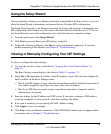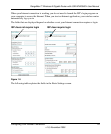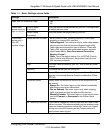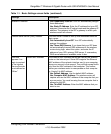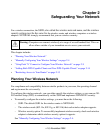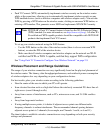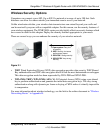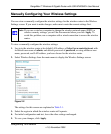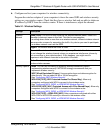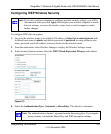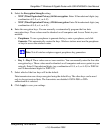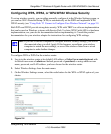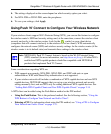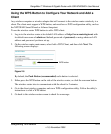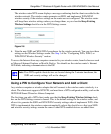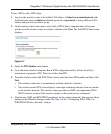
RangeMax™ Wireless-N Gigabit Router with USB WNR3500L User Manual
Safeguarding Your Network 2-5
v1.0, November 2009
6. Configure and test your computers for wireless connectivity.
Program the wireless adapter of your computers to have the same SSID and wireless security
settings as your wireless router. Check that they have a wireless link and are able to obtain an
IP address by DHCP from the wireless router. If there is interference, adjust the channel.
Table 2-1. Wireless Settings
Settings Description
Wireless
Network
Name (SSID): The SSID is also known as the wireless network name. Enter a 32-
character (maximum) name in this field. This field is case-sensitive.
In a setting where there is more than one wireless network, different wireless network
names provide a means for separating the traffic. Any device you want to participate
in a wireless network must use the SSID.
Region: The location where the router is used.
Channel: The wireless channel used by the gateway. The default is Auto.
Do not change the wireless channel unless you experience interference (shown by
lost connections or slow data transfers). If this happens, you might need to
experiment with different channels to see which is the best.
Mode: The default is up to 145 Mbps, which allows 802.11n, 802.11g, and 802.11b
wireless stations access.
Security Options • None. You can use this setting to establish wireless connectivity before
implementing wireless security. NETGEAR strongly recommends that you
implement wireless security.
• WEP (Wired Equivalent Privacy). Use encryption keys and data encryption for
data security. You can select 64-bit or 128-bit encryption.
See “Configuring WEP Wireless Security”.
• WPA-PSK [TKIP] (WiFi Protected Access Pre-Shared Key). Allow only
computers configured with WPA to connect to the wireless router.
See “Configuring WPA, WPA2, or WPA/WPA2 Wireless Security”.
• WPA2-PSK [AES] (Wi-Fi Protected Access with 2 Pre-Shared Keys). Allow only
computers configured with WPA2 to connect to the wireless router.
See “Configuring WPA, WPA2, or WPA/WPA2 Wireless Security”.
• WPA-PSK [TKIP] + WPA2-PSK [AES]. Allow computers configured with either
WPA-PSK or WPA2-PSK security to connect to the wireless router.
See “Configuring WPA, WPA2, or WPA/WPA2 Wireless Security”.



